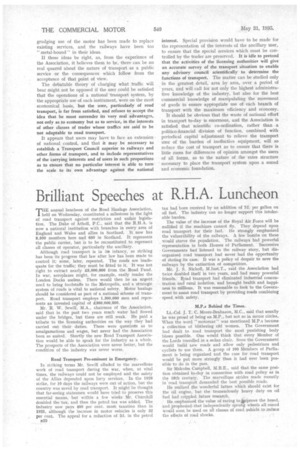Brilliant Speeches at R.H.A. Luncheon T HE annual luncheon of the
Page 48

If you've noticed an error in this article please click here to report it so we can fix it.
Road Haulage Association, held on Wednesday, constituted a milestone in the fight of road transport against restriction and unfair legislation. The Duke of Atholl, P.C., said that the R.H.A. is now a national institution with branches in every area of England and Wales and allies in Scotland. It now has 8,500 members here and 650 in Scotland. It represents the public carrier, but is to be reconstituted to represent all classes of operator, particularly the ancillary.
Although road transport is in its infancy, so striking has been its progress that law after law has been made to control it; some, later, repented. The roads are inadequate for the traffic; they must be fitted to it. It was hot right to extract nearly £5,000,000 from the Road Fund. In war, aeroplanes might, for example, easily render the London Docks useless. There would then be an urgent need to bring foodstuffs to the Metropolis, and a strategic system of roads is vital to national safety. Motor haulage should be considered as part of a national scheme of transport. Road transport employs 1,300,000 men and represents an invested capital of £300,000,000.
Mr. R. W. Sewill, M.A., chairman of the Association, said that in the past two years much water had flowed under the bridges, but these are still weak. He paid a tribute to the licensing authorities on the way they had carried out their duties, There were questions as to amalgamations and wages, but never had the Association been so united. Shortly the new Road Transport Association would be able to speak for the industry as a whole. The prospects of the Association were never better, but the condition of the industry was never worse.
Road Transport Pre-eminent in Emergency.
In striking terms Mr. Sewill alluded to the marvellous work of road transport during the war, when, at vital times, the railways could not be employed and the safety of the Allies depended upon lorry services. In the 1926 strike, for 10 days the railways were out of action, but the country was saved by road transport. It might be thought that far-seeing statesmen would have tried to preserve this essential means, but within a few weeks Mr. Churchill doubled the tax, and then the petrol tax was added. The industry now pays 400 per cent. more taxation than in 1925, although the increase in motor vehicles is only 32 per cent. The appeal for a reduction of 2d. in the petrol
n30 tax had been received by an addition of 7d. per gallon on oil fuel. The industry can no longer support this intolerable burden.
The value of the increase of the Royal Air Force will be nullified if the machines cannot fly. They depend upon road transport for their fuel. He strongly emphasized the vulnerability of the railways. A few bombs on these would starve the population. The railways had powerful representation in both Houses of Parliament. Successive Governments had listened to the railway story, but disorganized road transport had never had the opportunity of stating its case. It was a policy of despair to save the railways by the extinction of competitors.
Mr. J. S. Nichol], M.Inst.T., said the Association had twice doubled itself in two years, and had many powerful friends. Road transport had eliminated industrial concentration and rural isolation, and brought health and happiness to millions. It was reasonable to look to the Government to assist road transport by providing roads combining speed with safety.
M.P.s Behind the Times.
Lt.-Col. J. T. C. Moore-Brabazon, MC., said that usually he was proud of being an M.P., but not so in motor circles. When the word "motorcar" was mentioned M.P.s becamea collection of blithering old women. The Government had dealt to road transport the most punishing body blows possible. One would think that every Member of the Lords travelled in a sedan chair. Soon the Government would build tew roads and allow only pedestrians and cyclists to use them. A group of 100 Members of Parliament is being organized and the case for road transport would he put more strongly than it had ever been possible to do in the past.
Sir Malcolm Campbell, 14I.B.E., said that the same position obtained to-day in connection with road policy as in the 18th century. The marvellous strides made recently in road transport demanded the best possible roads.
He realized the wonderful future which should exist for the oil engine, but the tremendously heavy duty on oil fuel had crippled future research.
He emphasized the value of racing to prove the breed, and prophesied. that independently sprung wheels all round would soon be used on all classes of road vehicle_ to reduce the effects of road shocks.




































































































